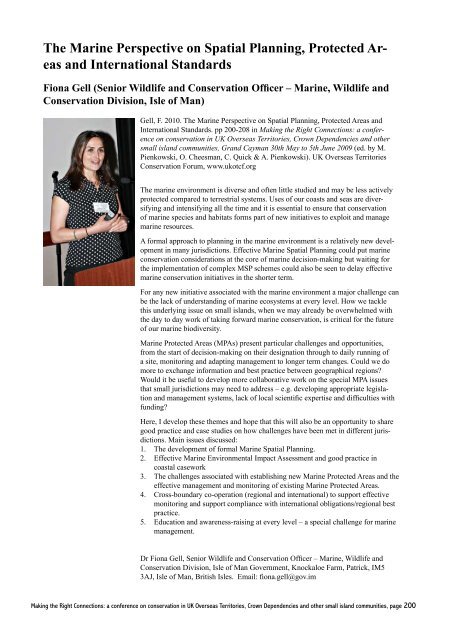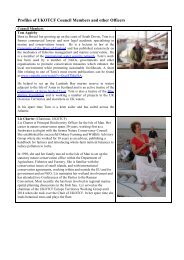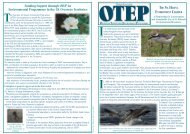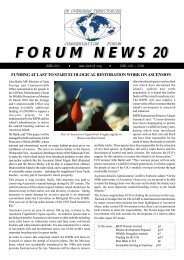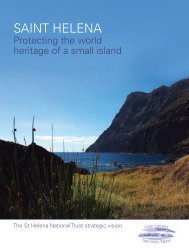Section 06 - UKOTCF
Section 06 - UKOTCF
Section 06 - UKOTCF
You also want an ePaper? Increase the reach of your titles
YUMPU automatically turns print PDFs into web optimized ePapers that Google loves.
The Marine Perspective on Spatial Planning, Protected Areas<br />
and International Standards<br />
Fiona Gell (Senior Wildlife and Conservation Officer – Marine, Wildlife and<br />
Conservation Division, Isle of Man)<br />
Gell, F. 2010. The Marine Perspective on Spatial Planning, Protected Areas and<br />
International Standards. pp 200-208 in Making the Right Connections: a conference<br />
on conservation in UK Overseas Territories, Crown Dependencies and other<br />
small island communities, Grand Cayman 30th May to 5th June 2009 (ed. by M.<br />
Pienkowski, O. Cheesman, C. Quick & A. Pienkowski). UK Overseas Territories<br />
Conservation Forum, www.ukotcf.org<br />
The marine environment is diverse and often little studied and may be less actively<br />
protected compared to terrestrial systems. Uses of our coasts and seas are diversifying<br />
and intensifying all the time and it is essential to ensure that conservation<br />
of marine species and habitats forms part of new initiatives to exploit and manage<br />
marine resources.<br />
A formal approach to planning in the marine environment is a relatively new development<br />
in many jurisdictions. Effective Marine Spatial Planning could put marine<br />
conservation considerations at the core of marine decision-making but waiting for<br />
the implementation of complex MSP schemes could also be seen to delay effective<br />
marine conservation initiatives in the shorter term.<br />
For any new initiative associated with the marine environment a major challenge can<br />
be the lack of understanding of marine ecosystems at every level. How we tackle<br />
this underlying issue on small islands, when we may already be overwhelmed with<br />
the day to day work of taking forward marine conservation, is critical for the future<br />
of our marine biodiversity.<br />
Marine Protected Areas (MPAs) present particular challenges and opportunities,<br />
from the start of decision-making on their designation through to daily running of<br />
a site, monitoring and adapting management to longer term changes. Could we do<br />
more to exchange information and best practice between geographical regions?<br />
Would it be useful to develop more collaborative work on the special MPA issues<br />
that small jurisdictions may need to address – e.g. developing appropriate legislation<br />
and management systems, lack of local scientific expertise and difficulties with<br />
funding?<br />
Here, I develop these themes and hope that this will also be an opportunity to share<br />
good practice and case studies on how challenges have been met in different jurisdictions.<br />
Main issues discussed:<br />
1. The development of formal Marine Spatial Planning.<br />
2. Effective Marine Environmental Impact Assessment and good practice in<br />
coastal casework<br />
3. The challenges associated with establishing new Marine Protected Areas and the<br />
effective management and monitoring of existing Marine Protected Areas.<br />
4. Cross-boundary co-operation (regional and international) to support effective<br />
monitoring and support compliance with international obligations/regional best<br />
practice.<br />
5. Education and awareness-raising at every level – a special challenge for marine<br />
management.<br />
Dr Fiona Gell, Senior Wildlife and Conservation Officer – Marine, Wildlife and<br />
Conservation Division, Isle of Man Government, Knockaloe Farm, Patrick, IM5<br />
3AJ, Isle of Man, British Isles. Email: fiona.gell@gov.im<br />
Making the Right Connections: a conference on conservation in UK Overseas Territories, Crown Dependencies and other small island communities, page 200


